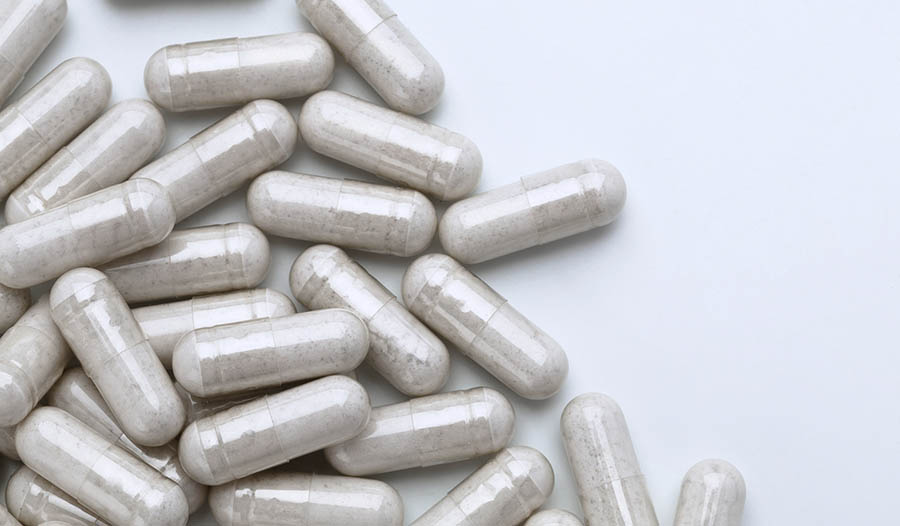Probiotics: 8 Science-Backed Benefits From Gut Health To Mood

Originally posted July 2017 / Updated August 2025
What Are Probiotics?
Probiotics are the beneficial bacteria that inhabit the human intestinal tract. The term probiotic is derived from Greek and literally means “for life.”
Probiotic Supplements
Supplement manufacturers of probiotics typically provide safely freeze-dried live forms of many of these beneficial bacteria so that they can be put in capsules, liquids, or food and brought back to life in the human intestinal tract.
Probiotic Foods
Probiotics are also found in fermented foods such as yogurt, aged and raw cheeses, kefir, kimchi, sauerkraut, and miso. The specific microorganisms found in these products will vary but usually include lactobacilli and bifidobacteria, which are the major probiotics found in dietary supplements.
Who Should Consider Taking A Probiotic?
The simple answer is that nearly everyone should consider taking a probiotic. The use of probiotics for a wide range of health benefits is supported by significant clinical research with over 1,000 double-blind, placebo-controlled studies. Much of the research has focused on the use of probiotics to promote gastrointestinal health and support immune function. Not surprisingly, these applications are the most common reasons why people add probiotics to their supplement routine. But clinical research also supports the use of probiotics for supporting many other health goals including for general health, boosting mood, supporting cardiovascular health, and for many women’s health issues including promotion of vaginal and urinary tract health.1
Here are the top ten reasons for considering a probiotic supplement:
- Individuals taking antibiotics
- Immune and GI support for infants, toddlers, and young children
- Infants with allergies are at risk for eczema and asthma
- People with Irritable Bowel Syndrome (IBS)
- Individuals with poor gut barrier function or "leaky gut"
- People with other gastrointestinal issues
- Women with recurrent vaginal or urinary tract infections
- People visiting areas where traveler’s diarrhea is a high risk
- People eating a poor diet or those under chronic stress
- Individuals taking a prescription or over-the-counter drug on an ongoing basis
Health Benefits Of Probiotics
Probiotics are beneficial bacteria that support your overall health by improving the gut microbiome. They work by:
- Creating a Barrier: They prevent harmful microbes from attaching to the gut lining.
- Improving the Environment: They produce beneficial compounds that nourish the gut and help other good bacteria thrive.
- Preventing "Dysbiosis": They help maintain a healthy microbial balance, which is key for avoiding digestive issues like gas, bloating, and indigestion.
Here is more detailed information on the key areas where probiotics may improve digestive health.
1. Stomach Irritation
Stomach irritation (dyspepsia) is often caused by Helicobacter pylori (H. pylori), a spiral-shaped bacterium that colonizes the stomach lining and weakens its protective barrier. Eradication typically involves triple or quadruple therapy, combining acid blockers with antibiotics (and sometimes bismuth).
Probiotics have been evaluated as adjuncts to triple therapy to improve efficacy and reduce side effects, especially antibiotic-associated diarrhea (AAD). Though not all strains are effective, several double-blind studies have shown that specific probiotics can enhance H. pylori eradication rates, reduce symptoms, and minimize drug-related side effects.10,11
A 2020 meta-analysis of 34 double-blind studies with 9,004 patients found that adding probiotics to triple therapy improved outcomes, particularly with Bifidobacterium-Lactobacillus and Bifidobacterium-Lactobacillus-Saccharomyces combinations, which achieved eradication rates of 78.3% and 88.2%, respectively.11
For optimal results, probiotic supplementation is recommended one week before, during, and one week after the 14-day treatment course to improve eradication and protect the microbiome.11,12
2. Irritable Bowel Syndrome (IBS) & SIBO
IBS, a functional gastrointestinal disorder, is now believed to be largely associated with dysbiosis and small intestinal bacterial overgrowth (SIBO). SIBO can cause gas, bloating, fatigue, and cognitive symptoms.13
Probiotics, particularly lactic acid-producing strains (Lactobacillus, Bifidobacterium), may worsen symptoms in SIBO.14 Meta-analyses on probiotics for IBS have yielded inconsistent results,15 but a recent review of 43 trials (5,531 patients) ranked Bacillus coagulans highest for symptom relief.16 Eight double-blind trials support its efficacy. A recent study using 6 billion CFU/day for 80 days showed significant improvements in abdominal pain, bloating, bowel habits, and even anxiety, with 63% of subjects symptom-free at study end.17
3. Immune Support
Probiotics play a key role in modulating immune responses, particularly by influencing gut-associated lymphoid tissue (GALT). Several clinical trials have shown that specific strains can reduce the incidence and duration of upper respiratory tract infections (URTIs), especially in children and older adults. In a meta-analysis of 20 randomized controlled trials, probiotics significantly reduced the number of participants experiencing ≥1 acute URTI episode by 42%, and reduced illness duration by 1.89 days.18 Lactobacillus rhamnosus GG, L. casei, and Bifidobacterium lactis are among the most effective strains for immune support.19
4. Antibiotic-Associated Diarrhea (AAD)
One of the well-established uses of probiotics is in antibiotic associated diarrhea (AA), which occurs in about 35% of individuals taking antibiotics due to disruption of the microbiome and the promotion of dysbiosis. Probiotics are well documented in preventing AAD including the more severe Clostridium difficile-associated diarrhea. Meta-analyses show that early probiotic use (within 48 hours of starting antibiotics) significantly improves outcomes. A pooled analysis of 36 double-blind, placebo-controlled trials (9,312 participants) found a 38% reduction in AAD, with higher efficacy when probiotics were started earlier—46% reduction if taken within 2 days, compared to 21% if started between days 3–7.4 Another meta-analysis reported a 58% reduction in C. difficile-associated diarrhea in hospitalized patients and over 70% in high-risk children and adults.5
5. Traveler’s Diarrhea
Probiotics have been studied for the prevention of traveler’s diarrhea (TD), which affects about 40 million people annually—primarily due to contaminated food or water during travel to developing countries. Causative agents include toxic strains of E. coli, Campylobacter, parasites, and viruses. While TD often resolves within 1–4 days, symptoms can persist for up to three months in one-third of cases.
Results from double-blind, placebo-controlled trials on probiotics for TD have been inconsistent, largely due to the wide variability in strains studied. Meta-analyses pooling these trials often mask strain-specific effects.8,9 However, one targeted meta-analysis of six randomized, double-blind, placebo-controlled trials identified Saccharomyces boulardii as the only probiotic to show a significant 21% reduction in TD incidence. Lactobacillus rhamnosus showed a non-significant trend toward benefit, while L. acidophilus and other strains showed no effect.9
6. Mood and Brain Health
Emerging evidence supports the role of the gut-brain axis in mental health, with probiotics (sometimes called psychobiotics) modulating neurotransmitter activity, inflammation, and the stress response.20
A meta-analysis of 34 human clinical trials involving 3,014 participants found that probiotic supplementation resulted in significant improvements in depression and anxiety scores, especially in individuals with mild-to-moderate symptoms.21 Strains like L. plantarum subspecies JYLP-326, L. helveticus R0052, B. breve CCFM1025, and B. longum R0175 were particularly effective, but generally multi-strain probiotics showed more consistent effects than single-strain interventions.22
Probiotic interventions have also shown promise in enhancing cognitive function in older adults by reducing stress-related gut symptoms and markers of inflammation.23
7. Women’s Health Support
Probiotics contribute to vaginal and urinary tract health by maintaining a low vaginal pH and inhibiting the growth of pathogens. Clinical trials have demonstrated that oral and vaginal use of Lactobacillus strains (especially L. rhamnosus GR-1 and L. reuteri RC-14) can help reduce the recurrence of bacterial vaginosis (BV) and urinary tract infections (UTIs).24
In one study, daily oral supplementation with these strains significantly reduced the recurrence of BV over six months compared to placebo.25
Probiotics may also support hormonal balance and gut integrity in women with some studies reporting improvements in insulin sensitivity, inflammatory markers, and menstrual regularity.26
8. Weight Management and Metabolic Health
Certain probiotic strains appear to influence appetite regulation, fat storage, insulin sensitivity, and systemic inflammation. A 2020 meta-analysis of 27 randomized trials found that probiotic supplementation led to modest but significant reductions in body weight, BMI, and waist circumference, particularly in overweight and obese adults.27
The most effective outcomes were associated with multi-strain formulations including Lactobacillus gasseri, L. rhamnosus, and Bifidobacterium breve. These strains may influence gut barrier function and endotoxin load, contributing to improved metabolic health.28 Probiotics have also been shown to improve fasting glucose, insulin resistance (HOMA-IR), and lipid profiles.29
Probiotic supplementation has been shown to beneficially affect serum cholesterol levels, particularly LDL cholesterol, total cholesterol, and in some cases HDL and triglycerides. These effects are believed to occur via several mechanisms, including deconjugation of bile acids, cholesterol assimilation by probiotic bacteria, and modulation of short-chain fatty acid production in the gut.
A 2017 meta-analysis of 32 randomized controlled trials involving 1,971 participants found that probiotics significantly reduced total cholesterol by 6.4 mg/dL and LDL-C by 4.9 mg/dL. The effect was more pronounced when multi-strain probiotics were used, and when the duration exceeded 8 weeks.30 Another meta-analysis in 2020 focusing on subjects with higher blood cholesterol levels showed even more benefits, with total cholesterol reductions of up to 13.4 mg/dL and LDL-C reductions of 10.1 mg/dL.31
Lactobacillus plantarum, L. reuteri NCIMB 30242, L. acidophilus, and Bifidobacterium longum have shown the most consistent effects in improving lipid profiles.32,33
Probiotic Supplements: Quality Matters
The quality of probiotic supplements depends on two main factors:
- The characteristics of the strains contained in the supplement.
- Adequate viability so that sufficient numbers of bacteria are viable at the point of consumption.
Viability at consumption depends on factors such as proper manufacturing and the “hardiness” of the strain, as well as packaging and storage of the product in the right amount of moisture and at the correct temperature.34
Dosage
The dosage of probiotic supplements is most often based on the number of live organisms present in the product. It is, therefore, important to use products that list the number of live organisms at expiration versus at the time of manufacture (which means nothing). Successful results are most often attained by taking between 5 billion and 20 billion viable organisms per day. Surprisingly, based on the clinical studies on these gastrointestinal issues, dosages in this range usually provide better results than dramatically higher dosages.
In general, probiotics are most often to be taken with food. The food will reduce the acidity of the stomach, provide nourishment to the probiotics, and assist in the transport to the intestines.
Frequently Asked Questions
How long does it take for probiotics to work?
In general, it depends upon the desired health goal. For example, for improving bowel regularity, the results might be observed in a day or two. For others, it may take up to four to six weeks.
What is the difference between probiotics, prebiotics, and postbiotics?
Probiotics are live beneficial bacteria. Prebiotics are non-digestible fibers (like resistant dextrin, inulin, or FOS) that serve as food for gut bacteria. Postbiotics are heat-killed bacteria or yeast, or the bioactive compounds produced by probiotics—such as short-chain fatty acids like butyrate.
Can you take probiotics every day?
Yes, probiotics can be consumed on a daily basis.
What are the signs you need probiotics?
Someone may benefit from probiotic supplementation if they experience signs of digestive disturbances, dysbiosis, or related health issues. Common signs and symptoms include:
- Frequent digestive discomfort – bloating, gas, constipation, diarrhea, or indigestion
- Antibiotic use – especially if followed by diarrhea or disrupted digestion
- Recurrent infections – such as urinary tract or yeast infections
- Food intolerances or sensitivities – especially to dairy or certain fibers
- Skin issues – including eczema, acne, or rosacea
- Weakened immunity – frequent colds or slow recovery from illness
- Mood changes – anxiety, brain fog, or low mood, linked to the gut-brain axis
- Bad breath or coated tongue – signs of oral or gut dysbiosis
These symptoms can suggest an imbalance in the gut microbiome, and use of probiotics may help restore balance, improve digestion, and support overall health.
References:
- Colella M, Charitos IA, Ballini A, et al. Microbiota revolution: How gut microbes regulate our lives. World J Gastroenterol. 2023 Jul 28;29(28):4368-4383.
- Zeng Q, Li P, Wu H, Zhuang Y, et al. Probiotics and gastrointestinal disorders: an umbrella meta-analysis of therapeutic efficacy. Eur J Med Res. 2025 Jun 23;30(1):515.
- Tüsüz Önata E, Özdemir Ö. Microbiome, dysbiosis and use of probiotics in various diseases. World J Virol. 2025 Jun 25;14(2):99574.
- Rueda-Robles A, Rodríguez-Lara A, Meyers MS, et al. Effect of Probiotics on Host-Microbiota in Bacterial Infections. Pathogens. 2022 Aug 29;11(9):986.
- Liao W, Chen C, Wen T, Zhao Q. Probiotics for the Prevention of Antibiotic-associated Diarrhea in Adults: A Meta-Analysis of Randomized Placebo-Controlled Trials. J Clin Gastroenterol. 2021 Jul 1;55(6):469-480.
- Goldenberg JZ, Yap C, Lytvyn L, et al. Probiotics for the prevention of Clostridium difficile-associated diarrhea in adults and children. Cochrane Database Syst Rev. 2017 Dec 19;12(12):CD006095.
- Zhang L, Zeng X, Guo D, Zou Y, Gan H, Huang X. Early use of probiotics might prevent antibiotic-associated diarrhea in elderly (>65 years): a systematic review and meta-analysis. BMC Geriatr. 2022 Jul 6;22(1):562.
- Shen NT, Maw A, Tmanova LL, et al. . Timely Use of Probiotics in Hospitalized Adults Prevents Clostridium difficile Infection: A Systematic Review With Meta-Regression Analysis. Gastroenterology. 2017 Jun;152(8):1889-1900.e9.
- Collinson S, Deans A, Padua-Zamora A, et al. Probiotics for treating acute infectious diarrhoea. Cochrane Database Syst Rev. 2020 Dec 8;12(12):CD003048.
- McFarland LV, Goh S. Are probiotics and prebiotics effective in the prevention of travellers’ diarrhea: A systematic review and meta-analysis. Travel Med Infect Dis. 2019 Jan-Feb;27:11-19.
- Shi X, Zhang J, Mo L, Shi J, Qin M, Huang X. Efficacy and safety of probiotics in eradicating Helicobacter pylori: A network meta-analysis. Medicine (Baltimore). 2019 Apr;98(15):e15180.
- Wang Y, Wang X, Cao XY, Zhu HL, Miao L. Comparative effectiveness of different probiotics supplements for triple helicobacter pylori eradication: a network meta-analysis. Front Cell Infect Microbiol. 2023 May 15;13:1120789.
- He C, Xie Y, Zhu Y, et al. Probiotics modulate gastrointestinal microbiota after Helicobacter pylori eradication: A multicenter randomized double-blind placebo-controlled trial. Front Immunol. 2022 Nov 8;13:1033063.
- Shah A, Talley NJ, Holtmann G. Current and Future Approaches for Diagnosing Small Intestinal Dysbiosis in Patients With Symptoms of Functional Dyspepsia. Front Neurosci. 2022 May 6;16:830356.
- Rao SSC, Rehman A, Yu S, Andino NM. Brain fogginess, gas and bloating: a link between SIBO, probiotics and metabolic acidosis. Clin Transl Gastroenterol. 2018 Jun 19;9(6):162.
- Konstantis G, Efstathiou S, Pourzitaki C, et al. Efficacy and safety of probiotics in the treatment of irritable bowel syndrome: A systematic review and meta-analysis of randomised clinical trials using ROME IV criteria. Clin Nutr. 2023 May;42(5):800-809.
- Zhang T, Zhang C, Zhang J, Sun F, Duan L. Efficacy of Probiotics for Irritable Bowel Syndrome: A Systematic Review and Network Meta-Analysis. Front Cell Infect Microbiol. 2022 Apr 1;12:859967.
- Gupta AK, Maity C. Efficacy and safety of Bacillus coagulans LBSC in irritable bowel syndrome: A prospective, interventional, randomized, double-blind, placebo-controlled clinical study [CONSORT Compliant]. Medicine (Baltimore). 2021 Jan 22;100(3):e23641.
- Hao Q, Dong BR, Wu T. Probiotics for preventing acute upper respiratory tract infections. Cochrane Database Syst Rev. 2015;(2)\:CD006895.
- Moshfeghinia R, Nemati H, Ebrahimi A, et al. The impact of probiotics, prebiotics, and synbiotics on depression and anxiety symptoms of patients with depression: A systematic review and meta-analysis. J Psychiatr Res. 2025 Aug;188:104-116.
- Liu RT, Walsh RFL, Sheehan AE. Prebiotics and probiotics for depression and anxiety: A systematic review and meta-analysis of controlled clinical trials. Neurosci Biobehav Rev. 2019;102:13-23.
- Sulaiman NNY, Mohamad Nizam NB, Mohd Noor NA, Lim SM, Ramasamy K, Alabsi AM, Ismail MF. An updated systematic review and appraisal of the pathophysiologic mechanisms of probiotics in alleviating depression. Nutr Neurosci. 2025 Jul 16:1-21.
- Wiegers C, Doğan S, Metzelaar M, Larsen OFA. The role of probiotics in the improvement of cognitive performance of older adults: a meta-analysis. Benef Microbes. 2025 Jun 6:1-15.
- Reid G, Charbonneau D, Erb J, et al. Oral use of Lactobacillus rhamnosus GR-1 and L. fermentum RC-14 significantly alters vaginal flora: randomized, placebo-controlled trial in 64 healthy women. FEMS Immunol Med Microbiol. 2003;35(2):131-134.
- Ya W, Reifer C, Miller LE. Efficacy of vaginal probiotic capsules for recurrent bacterial vaginosis: a double-blind, randomized, placebo-controlled study. Am J Obstet Gynecol. 2010;203(2):120.e1–6.
- Karamali M, Dadkhah F, Sadrkhanlou M, et al. Effects of probiotic supplementation on glycemic control and lipid profiles in women with polycystic ovary syndrome: A randomized, double-blind, placebo-controlled trial. Fertil Steril. 2018;110(4):733-739.
- John GK, Wang L, Nanavati J, et al. Dietary alteration of the gut microbiome and its impact on weight and fat mass: a systematic review and meta-analysis. Genes (Basel). 2018;9(3):167.
- Kadooka Y, Sato M, Ogawa A, et al. Effect of Lactobacillus gasseri SBT2055 in fermented milk on abdominal adiposity in adults in a randomized controlled trial. Br J Nutr. 2013;110(9):1696-1703.
- Kassaian N, Feizi A, Aminorroaya A, Jafari P, Ebrahimi MT. Effects of probiotic supplementation on glycemic control: A systematic review and meta-analysis of clinical trials. J Diabetes Metab Disord. 2019;18(1):97-112.
- Guo Z, Liu XM, Zhang QX, et al. Influence of consumption of probiotics on the plasma lipid profile: a meta-analysis of randomized controlled trials. Nutrition, Metabolism & Cardiovascular Diseases. 2011;21(11):844–850.
- Cho YA, Kim J. Effect of probiotics on blood lipid concentrations: A meta-analysis of randomized controlled trials. Medicine (Baltimore). 2020;99(11):e19313.
- Shimizu M, Hashiguchi M, Shiga T, Tamura HO, Mochizuki M. Meta-analysis: Effects of probiotic supplementation on lipid profile in normal to mildly hypercholesterolemic individuals. PLoS One. 2021;16(1):e0245533.
- Jones ML, Martoni CJ, Parent M, Prakash S. Cholesterol-lowering efficacy of a microencapsulated bile salt hydrolase-active Lactobacillus reuteri NCIMB 30242 yoghurt formulation in hypercholesterolemic adults. Br J Nutr. 2012;107(10):1505–1513.
- Pramanik S, Venkatraman S, Karthik P, Vaidyanathan VK. A systematic review on selection characterization and implementation of probiotics in human health. Food Sci Biotechnol. 2023 Jan 10;32(4):423-440.
DISCLAIMER:This Wellness Hub does not intend to provide diagnosis...
















































































 Table of Contents
Table of Contents















